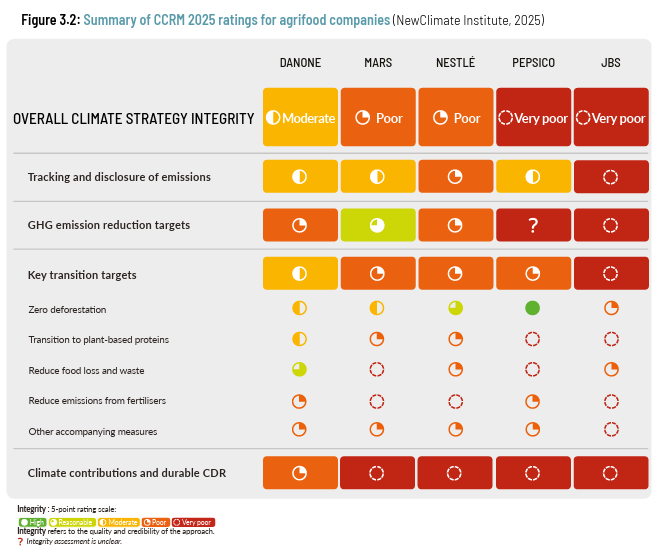I’m on the visionary panel. To register, click here.

I’m indebted to Elaine Watson of AgFunder for posting this on X (Twitter): “New report accuses Big Food of ‘corporate #greenwashing.’ @Danone and @Nestle hit back”
This seemed worth a look and I went right to it. “Danone and Nestlé hit back after new report accuses Big Food of ‘corporate greenwashing.’”
The 38-page report comes from the New Climate Institute: “Corporate Climate Responsibility Monitor 2025: Food and Agriculture Sector Deep Dive: Assessing the Transparency, Integrity and Progress of Corporate Climate Strategies.”
It compares the climate promises and actions of five companies—Danone, JBS, Mars, Nestlé, and PepsiCo—with respect to deforestation, transition from animal- to plant-based products, emissions from fertilizers, reduced waste, and other measures.
Here’s the summary:
Its conclusions:
- We find that agrifood companies present measures that are unlikely to lead to structural, deep emission reductions in the sector.
- We find that agrifood companies’ emission reduction targets are currently undermined by the undefined role for land-based carbon removals.
- Standard setters need to anchor the need for deep and structural emission reductions in their voluntary standards and guidelines, guided by key transitions for the sector, and need to call for separate targets for emission reduction and removal.
Danone and Nestlé argue that they are committed to reducing their environmental impact and making good progress.
Comment
It would be nice if they were. But to point out the obvious: food companies have no market incentive to reduce their environmental impact if it is going to raise their costs. Of course JBS comes across as Very Poor; it is a meat company and meat production releases much greater emissions than for any other food. It is much to the advantage of Big Food to pass the externalized costs of production onto taxpayers, which is what they now do. This situation calls for regulation. At the moment, regulation is an unlikely possibility, but we can always hope—and work toward that goal by holding corporations accountable for their greenwashing promises.